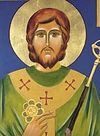

| Previous day | Next day |
| Old Style
March 17
|
Wednesday |
New Style
March 30
|
|
4th Week of Great Lent.
Tone 7.
Great Lent. |
Monastic rule: xerophagy (bread, uncooked fruits and vegetables).
|
![]() St. Alexis the Man of God, in Rome (411).
St. Alexis the Man of God, in Rome (411). ![]() St. Macarius, founder of Kalyazin Monastery (Tver) (1483).
St. Macarius, founder of Kalyazin Monastery (Tver) (1483).
Martyr Marinus the Soldier, at Caesarea in Palestine (260). St. Patrick, bishop of Armagh and enlightener of Ireland (451). St. Parthenius of the Kiev Caves (1855).
New Hieromartyr Victor Kiranov, archpriest, of Berdyansk (Crimea) (1942).
St. Ambrose, deacon, of Alexandria (400). St. Gertrude, abbess, of Nivelles (659). St. Beccan of Rhum (677). St. Withburga, solitary at Holkham and East Dereham (ca. 743). Monk-martyr Paul of Crete (767). Hieromartyr Gabriel the Lesser, of Gareji, Georgia (1802). St. Gurias, archbishop of Tauria and Simferopol (1882). St. Theosterictus the Confessor, abbot of Pelecete Monastery near Prusa (826).
Repose of Archbishop Tikhon (Troitsky) of San Francisco (1963).
Thoughts for Each Day of the Year
According to the Daily Church Readings from the Word of God
By St. Theophan the Recluse

Wednesday.
Baptism (kreshenie) in the Russian language sounds like cross (krest). This is fortunate consonance, for although the visible action of baptism is submersion, its essence is a co-crucifixion with Christ on the inner, spiritual cross. The Apostle Paul says: our old man is crucified with him in baptism (Rom. 6:6). This is not some sort of mechanical act, but a moral change, or a revolution of thoughts, goals, desires, and sympathies. Before, all of these were stained with self-pleasure; now all are selflessly dedicated to God, in Christ Jesus, by the grace of the Holy Spirit. [If you were baptized as an infant] you will say, “I didn’t understand that when I was baptized.” Now you understand; set it in your conscience to carry out the meaning of baptism, for your baptism is indelible. Even at the judgement its seal will be visible either for you, or against you.
Articles
 Martyr MarinusAfter cruel tortures, the saint was beheaded. |







